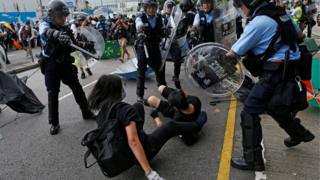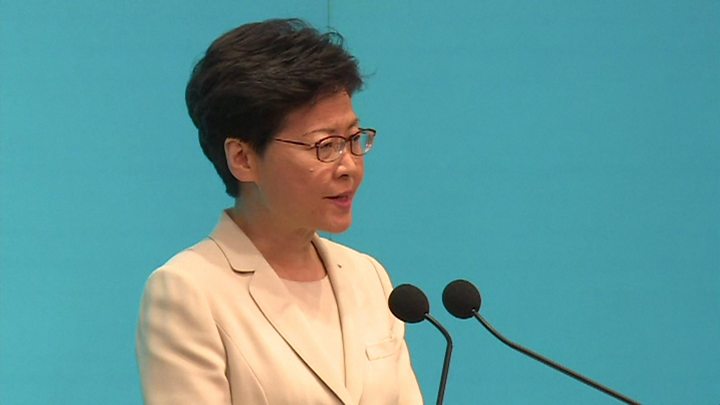 Image copyright
Reuters
Image copyright
Reuters
Police have clashed with protesters in Hong Kong on the 22nd anniversary of its shift from British to Chinese rule.
City chief Carrie Lam attended the annual flag-raising ceremony on Monday, while police used pepper spray to contain demonstrators.
Millions have protested in recent weeks over a controversial extradition bill, which would allow people to be sent to mainland China for trial.
The government has agreed to suspend it indefinitely, but the rallies continue.
Ms Lam is facing ongoing calls for her resignation, and large crowds are expected to attend the annual pro-democracy demonstration later.
Their demands include a complete withdrawal of the extradition bill, revoking the term "riot" to describe protests on 12 June, releasing all detained activists, and investigations into police violence.
Speaking on Monday, Ms Lam said events in June had made her realise she needed to invest more time listening to people.
"I will learn the lesson and ensure that the government's future work will be closer and more responsive to the aspirations, sentiments and opinions of the community," she said.
As she attended the official ceremony to mark the handover, protesters held a parallel event nearby, raising a black flag to show their fears for freedom in the territory.
Authorities said demonstrators had blocked several roads in the city from 0400 local time.
A police statement condemned "illegal acts" by protesters who it said had taken iron poles and guard rails from nearby construction sites. It warned demonstrators not to throw bricks or charge police cordon lines.
Why have people been protesting?
Hong Kong has been part of China since 1997 under the "one country, two systems" principle, which allows it freedoms not seen on the mainland, including judicial independence.
The extradition bill raised concerns for that status.
Critics of the bill feared it could be used to target opponents of the government in Beijing, and to bring Hong Kong further under China's control.
On 12 June police used tear gas and rubber bullets to disperse crowds marching against the bill - the worst violence in the city in decades.
Eventually, the demonstrations forced the government to apologise and suspend the planned extradition law.

There have also been smaller demonstrations from the territory's pro-Beijing movement, however.
On Sunday, thousands of pro-Beijing protesters rallied in support of the territory's police.